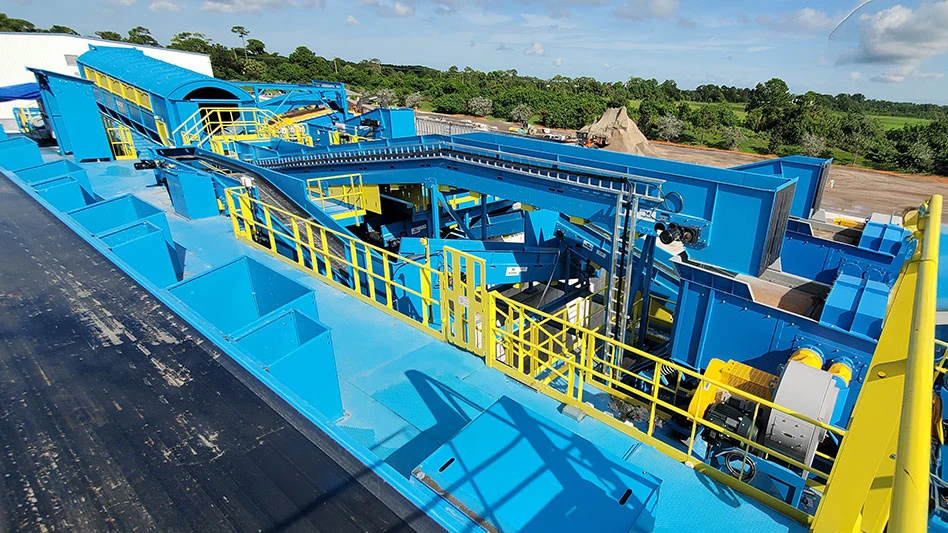 Chris Ockenfels |
Reining in the attention span of Chris Ockenfels is not always easy, and Chris is the first to admit it. But building a state-wide secure document destruction business has captured Chris’ attention for nearly 10 years as he has helped guide Document Destruction & Recycling Services (DDRS) to become an industry leader in the state of Iowa as well as nationally.
Under Chris’ leadership, DDRS has become a critical component of City Carton Recycling Iowa City, Iowa.
The family business, started as a cartage company in 1964 by Chris’ father Mort Ockenfels, has been involved in paper recycling since 1967. Chris is one of five brothers (John, Andy, Tim and Mark are the others) who have helped City Carton become Iowa’s largest recycling company, and he has adopted the lead role in DDRS becoming one of Iowa’s leading confidential shredding services.
NEW PRIORITIES
DDRS was started as a separate business unit of City Carton Recycling in 1996, and Chris was initially designated as the leader of the subsidiary because of his interest in designing and setting up facilities. "My career at City Carton had been to get new operations up and running," says Chris of his work experience before heading up DDRS.
He notes that he helped design and start up recycling facilities in Muscatine, Cedar Rapids and Iowa City, Iowa, before taking the helm of DDRS. "I would get bored with day-to-day operations and go to a new start-up," Chris says of his 1990s career path.
But upon accepting the role at DDRS, Chris not only started attending annual conferences of the National Association for Information Destruction (NAID), but became involved with the organization to the extent that the has served in several officer roles with NAID, leading up to his current position as president of the organization.
At the 2005 Paper Recycling Conference & Trade Show, which took place in Atlanta this June, Chris offered a presentation that detailed the ways operating a confidential shredding company is different from operating a paper recycling business.
While City Carton’s traditional recycling business was "commodity based," DDRS is security oriented and service based. For City Carton Recycling a focus on efficiency is crucial. For DDRS, security is the top priority. "The physical process of shredding is the easy part; keeping everyone committed to security is the key," he remarked.
Through his management of DDRS and his involvement with NAID, Chris has helped not only City Carton but also other recycling companies understand the different priorities and procedures that a document destruction firm must have vs. a materials recycler.
He remarks, "At DDRS, we set the culture that shredding it properly is the first priority, then you worry about the value of the material."
Because of City Carton’s recycling knowledge and roots, DDRS is still able to "get the most benefit we can out of the fiber," says Chris.
While some recyclers and mill consumers lament the scrap paper grading and classification changes that increased document destruction has brought (including increased contamination), Chris notes that there is a positive side to it as well. "Overall, the document destruction industry has brought more fiber into the stream. It cost-justifies the placement of one or two bins in a smaller office."
| DDRS At a Glance |
|
Principals: Chris Ockenfels, division manager; John Ockenfels, president of parent company City Carton Recycling; Andy Ockenfels, vice president of parent company City Carton Recycling.Locations: Cedar Rapids, Iowa, headquarters and secure shredding plant; additional facilities in Altoona and Davenport, Iowa.Number of Employees: 13 for DDRS. Approximately 125 at City Carton Recycling overall.Truck Fleet: Six collection trucks and one mobile shredding truck.Shredding Equipment: Vecoplan RG 52U Shorty model; Allegheny 100-hp and 20-hp models. Baling Equipment: One American Baler model; one Maren horizontal baler; and one JV Manufacturing Cram-A-Lot baler.Services Provided: NAID AAA-certified, plant-based document destruction; on-site mobile shredding service. |
BRANCHING OUT
The Ockenfels family has boosted the fortunes of City Carton Recycling over the past several decades by branching out to provide service coverage to much of the state of Iowa.
In addition to its Iowa City headquarters and facility, City Carton now operates recycling facilities in Cedar Falls, Cedar Rapids, Creston, Davenport, Mount Pleasant and Muscatine, Iowa.
Similarly, the DDRS subsidiary has extended its reach within Iowa by operating not only from its original Cedar Rapids location, but now from two additional branches in Davenport and in Altoona (near Des Moines).
"We started out performing plant-based shredding only, although in 2002 we purchased a mobile shredding truck," says Chris.
The majority of the company’s business involves plant-based shredding, however. "Our customers are comfortable with the plant-based model, and we have NAID AAA certification for in-plant shredding," says Chris.
A 100-hp shredder from Allegheny Paper Shredders, Delmont, Pa., resides at the Cedar Rapids facility, while a smaller Allegheny unit and the mobile shredding truck combine to serve customers in Davenport.
The DDRS facility in Altoona serves as the home of a newly-purchased RG 52U "Shorty" cross-cut shredder made by Vecoplan, Archdale, N.C. Balers made by several different manufacturers help convert shredded material into marketable recovered fiber.
The Ockenfels brothers and other DDRS personnel take the equipment shopping task seriously. According to Chris, the company has made a point of emphasis to "work with equipment manufacturers to help them improve their products throughout the years."
Chris’ training and experience has included pertinent college coursework as well as being self-taught in areas such as AutoCAD design when setting up new plants.
He says he believes the productivity and thorough shredding capabilities of the new Vecoplan unit "gives us a marketing edge." Chris adds, "Vecoplan is producing the equipment that I see the market turning to."
The shredding equipment is destroying confidential documents belonging to a wide variety of companies and government agencies, according to Chris. "Everybody has material to be shredded," he comments.
Chris’ involvement with NAID has helped DDRS both in the equipment procurement and marketing of services aspects, he says. Networking contacts made through NAID have proven valuable for studying the track records of equipment.
As current president of NAID, Chris is also one of the organization’s foremost boosters. He says NAID’s ability to determine the shredding responsibilities associated with government regulations such as HIPAA, FACTA and the Gramm-Leach-Bliley Act have helped, as have related marketing brochures produced by the association.
| Stepping in as a Referee |
|
Before he stepped into his current role as National Association for Information Destruction (NAID) president, Chris Ockenfels chaired the NAID Ethics Committee that developed the Complaint Resolution Council and was the first chair of the Council. Chris says he is proud of the Council and the role it has played in helping companies adhere to guidelines that will enhance the image of the industry. "I think the Complaint Resolution Council comes second right behind NAID certification in importance," says Chris. "A code of ethics doesn’t carry a lot of meaning unless you enforce it." In his past role on the Council, Chris investigated several complaints involving things such as misleading advertising or the improper use of the NAID certification logo. "A dispute that is filed helps keep people on their toes about the gray areas, like making hard-to-prove claims such as, ‘The most secure system in the world,’" says Chris. |
PLENTY TO SHRED
Confidential shredding and managing DDRS has kept Chris’ attention in part because it is a dynamic and growing market.
The growth of DDRS has been a team effort, he notes, as he reports to his brother Andy, who is vice president of operations for all of City Carton. As president of City Carton, his brother John is heavily involved in long-range planning for DDRS.
The company also strives to "share a lot of information with our management and staff," says Chris. "If they know how their decisions affect profits and losses, they are more apt to make a better decision."
With 125 employees, City Carton has in some ways moved beyond its small family business roots, but nonetheless strives to hold onto those roots. "We run a business that is professionally managed, but it’s family-oriented," says Chris. The company still hosts summer picnics and winter holiday parties to help "promote teamwork and friendship among employees," says Chris. "We try to make it a place where people want to come to work."
Retaining the family atmosphere is just one of several management tasks that will keep Chris and his brothers busy this year and next. The expansion of DDRS into the Des Moines market has been part of a "big expansion phase," says Chris. "Now we’re working to improve densities in the markets we’re in."
He says he is confident the company can hold its own against growing national competitors and can also continue to find new customers who have not yet used an outside shredding firm.
Regarding the competitive arena, Chris says DDRS—because of its status as a subsidiary of a larger company—enjoys some of the same advantages as national shredding firms. "We’re large enough to have shared departments among the different cities that we’re in and to be flexible with our customers," says Chris. "We can provide service the way they want it, not just a couple of options. And we can compete on price."
The company retains an advertising budget that keeps its name in front of Iowa’s business community. "We advertise heavily in local phone books and business newspapers; that’s worked out very well," says Chris.
He says he expects the market to remain one with plenty of opportunity, some of it fueled by increasing government interest in protecting privacy and preventing identity theft. "There are a number of competing bills in Congress toward putting together a comprehensive identity theft deterrence bill," Chris comments. He notes that the bill will almost certainly include provisions regarding the storage, transfer and destruction of records. "This will be all-inclusive, not just covering finance or health care."
Such legislative drivers combined with fears of being found liable for information leaks will keep shredders humming, Chris predicts. "Everywhere there should always be people looking for shredding services. There are still banks and hospitals—even years after Gramm-Leach-Bliley and HIPAA—that are not shredding."
The opportunities are enough to keep Chris interested for some time to come. "It’s still exciting and it’s still fun," Chris says of his work with DDRS. "It’s an expanding industry—I feel like we’re still just starting up."
The author is editor of Secure Destruction Business and can be contacted at btaylor@gie.net.
Latest from Recycling Today
- Greenwave raises revenue but loses money in Q2 2025
- Recycled steel prices hold steady
- EY says India’s need for scrap imports will continue
- Coming full circle
- Amcor, DCM introduce fertilizer packaging with 35 percent recycled content
- Comstock Metals gets closer to commissioning commercial-scale solar panel recycling facility
- Washington selects Circular Action Alliance as PRO
- Smurfit Westrock expands in Latin America





